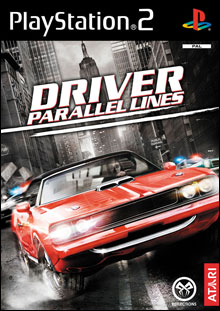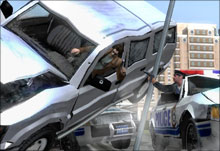 I suppose it’s possible that someone who was imprisoned during the Super Nintendo era would be wowed if he encountered Driver: Parallel Lines upon his release. The rest of us will not be able to avoid the sneaking suspicion that we’ve seen all this somewhere before.
I suppose it’s possible that someone who was imprisoned during the Super Nintendo era would be wowed if he encountered Driver: Parallel Lines upon his release. The rest of us will not be able to avoid the sneaking suspicion that we’ve seen all this somewhere before.
The Grand Theft Auto comparisons are unavoidable, and unflattering. Driver: Parallel Lines casts you as
TK
, a hip cat living the dream in 1978 New York City. TK (sure to play tricks on copy editors everywhere) plies his trade as a freelance wheelman, ferrying crime bosses and illicit cargo across the sprawling metropolis. Business is booming until a double cross sends TK to the slammer for 28 years. When he gets back on the streets, in 2006, he’s got only one thing on his mind: going legit.
Just kidding, though a game about an ex-con struggling to keep an even keel at a temp job has the potential to be more interesting than this derivative fare. Instead, TK metes out brutal revenge to those who have wronged him, and he does so by — sigh — driving recklessly and shooting people. Whee.
The problem is not that Parallel Lines is unambitious. It’s that it’s ambitious in all the wrong ways. The presentation can be spectacular, with gorgeous pre-rendered cutscenes and decent voice acting. Vehicles accrue damage organically — you’ll see them sag to one side, lose a taillight, or start emitting smoke from under the hood. New York City’s boroughs are rendered with impressive scope and accuracy. Most of all, the decades-spanning story and accompanying æsthetic shifts are inspired enough to deserve a better gameplay foundation.
The mission variety simply isn’t there. There are only so many different ways a man can use his wheels to skirt the law. Only so many times shooting another car until it explodes can seem fresh. The size of the gamespace is a technological marvel, but that sometimes turns out to be a drawback: nothing is more boring than spending several minutes trying to reach the starting point of a mission, especially given how crowded the streets are. Those of you slogging through The Godfather right now can empathize.
ADVERTISEMENT
 |
 Despite all this, Parallel Lines might have been able to coast on the strength of its story and the inherent awesomeness of outrunning the fuzz if not for a few crippling flaws. For one thing, the on-foot sections of the game continue to be the series’s Achilles heel. The control isn’t great (why can’t TK jump?), and the camera seems to enjoy swinging around your character for no apparent reason. Although the overall experience is car-centric, the lack of interactivity when you’re on foot really hurts.
Despite all this, Parallel Lines might have been able to coast on the strength of its story and the inherent awesomeness of outrunning the fuzz if not for a few crippling flaws. For one thing, the on-foot sections of the game continue to be the series’s Achilles heel. The control isn’t great (why can’t TK jump?), and the camera seems to enjoy swinging around your character for no apparent reason. Although the overall experience is car-centric, the lack of interactivity when you’re on foot really hurts.
Worse, the driving just isn’t intense enough. One hundred miles per hour feels like 40. The vehicle physics seem appropriately heavy — no small achievement — but sometimes that’s a flaw. Atari claims the chases are “Hollywood-style,” but I can’t think of many Hollywood blockbusters where the chase-scene pace car comes to a halt every time it grazes a bystander’s bumper.
Given that you can find hotter driving action in racing games and better sandbox-style mayhem in the GTA series, it’s hard to know what niche the makers of Driver: Parallel Lines thought they were filling. On the other hand, the game does have the best computer-generated strippers I’ve ever seen.